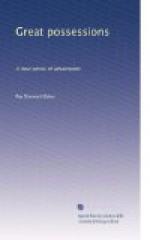Ever since I have known him, Horace has been rather high-and-mighty with me; but I know he enjoys my visits, for I give him always, I think, a pleasantly renewed sense of his own superiority. When he sees me his eye lights up with the comfortable knowledge that he can plough so much better than I can, that his corn grows taller than mine, and his hens lay more eggs. He is a wonderfully practical man, is Horace; hard-headed, they call it here. And he never feels so superior, I think, as when he finds me sometimes of a Sunday or an evening walking across the fields where my land joins his, or sitting on a stone fence, or lying on my back in the pasture under a certain friendly thorn-apple tree. This he finds it difficult to understand, and thinks it highly undisciplined, impractical, no doubt reprehensible.
One incident of the sort I shall never forget. It was on a June day only a year or so after I came here, and before Horace knew me as well as he does now. I had climbed the hill to look off across his own high-field pasture, where the white daisies, the purple fleabane, and the buttercups made a wild tangle of beauty among the tall herd’s grass. Light airs moved billowing across the field, bobolinks and meadow larks were singing, and all about were the old fences, each with its wild hedgerow of choke cherry, young elms, and black raspberry bushes, and beyond, across miles and miles of sunny green countryside, the mysterious blue of the ever-changing hills. It was a spot I loved then, and have loved more deeply every year since.
Horace found me sitting on the stone fence which there divides our possessions; I think he had been observing me with amusement for some time before I saw him, for when I looked around his face wore a comfortably superior, half-disdainful smile.
“David,” said he, “what ye doin’ here?”
“Harvesting my crops,” I said.
He looked at me sharply to see if I was joking, but I was perfectly sober.
“Harvestin’ yer crops?”
“Yes,” I said, the fancy growing suddenly upon me, “and just now I’ve been taking a crop from the field you think you own.”
I waved my hand to indicate his high-field pasture.
“Don’t I own it?”
“No, Horace, I’m sorry to say, not all of it. To be frank with you, since I came here, I’ve quietly acquired an undivided interest in that land. I may as well tell you first as last. I’m like you, Horace, I’m reaching out in all directions.”
I spoke in as serious a voice as I could command: the tone I use when I sell potatoes. Horace’s smile wholly disappeared. A city feller like me was capable of anything!
“How’s that?” he exclaimed sharply. “What do you mean? That field came down to me from my grandfather Jamieson.”
I continued to look at Horace with great calmness and gravity.
“Judging from what I now know of your title, Horace,” said I, “neither your grandfather Jamieson nor your father ever owned all of that field. And I’ve now acquired that part of it, in fee simple, that neither they nor you ever really had.”




